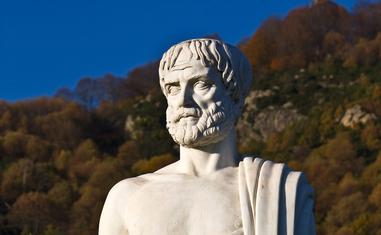The views expressed in our content reflect individual perspectives and do not represent the authoritative views of the Baha'i Faith.

Aristotle defined virtue as the desirable middle ground between two extremes, the Golden Mean. In Aristotle’s philosophy, virtue is a state of being, “a state apt to exercise deliberate choice, being in the relative mean, determined by reason, and as the person of practical wisdom would determine.” Aristotle argued that deficiency or excess destroys virtue.
RELATED: Where Do Philosophers Get their Wisdom?
Buddha summarized the Golden Mean as the Middle Way, a moderate path between extreme self-denial and sensual, materialistic self-indulgence.
The Bible says “Whoever fears God will avoid all extremes.” – Ecclesiastes 7:18.
Islam is called the Middle Way, because it emphasizes moderation rather than rigid monasticism or its extreme opposites, greed and acquisitiveness.
RELATED: What’s the Difference Between a Prophet and a Philosopher?
In the tradition of all great Faiths, the Baha’i teachings give us similar spiritual advice. Baha’u’llah, the prophet and founder of the Baha’i Faith, wrote:
The word of God which the Supreme Pen hath recorded on the ninth leaf of the Most Exalted Paradise is this: In all matters moderation is desirable. If a thing is carried to excess, it will prove a source of evil.
And Abdu’l-Baha, the authorized interpreter of the Baha’i writings and the son of Baha’u’llah, wrote:
How often has it happened that an individual who was graced with every attribute of humanity and wore the jewel of true understanding, nevertheless followed after his passions until his excellent qualities passed beyond moderation and he was forced into excess. His pure intentions changed to evil ones, his attributes were no longer put to uses worthy of them, and the power of his desires turned him aside from righteousness and its rewards into ways that were dangerous and dark. A good character is in the sight of God and His chosen ones and the possessors of insight, the most excellent and praiseworthy of all things, but always on condition that its center of emanation should be reason and knowledge and its base should be true moderation.
But in our everyday circumstances, we tend to have excesses and deficiencies rather than moderation.
How can we return to a golden mean, a moderate and reasonable way of life that avoids excess in favor of tact, wisdom and refinement? How can we control our desires, make our conduct fair and balanced, and moderate our actions?
Obviously, as human individuals, our circumstances and our tastes differ. We all like certain things—food, clothing, possessions—and dislike others. Some contemporary western philosophers believe that everything relates to our tastes—but if we use taste as our only criteria, it can lead to excess. If I like cake, for example, I might be tempted to eat cake at every meal, but that kind of excess wouldn’t be healthy or wise. Maintaining a relativity of balance and wisdom in our circumstances requires the will-power of the individual to overcome and moderate our tastes.
We can benefit from most things when we use moderation—and, at the same time, by asking God’s grace through prayer.
The teachings of Baha’i Faith recommend moderation in all things. As just one example, the Baha’i principle of moderation condemns the extremes of wealth and poverty, and asks us to find a spiritual solution to humanity’s economic problems. Baha’u’llah spoke out against asceticism and monasticism, and encouraged the Baha’is to appreciate the blessings and beauty of this world with joy and happiness.
From Aristotle’s perspective, and from a Baha’i perspective, we should always seek moderation as a path to a virtuous life. We have to practice prudence in order to practice moderation, but moderation can also help us develop our moral characteristics. If the human soul would channel the blessings of the world by remembering God and obeying his laws, moderation could lead us to a kinder and more gentle world.
You May Also Like
Comments

















finely balance priorities in reaction
to the seemingly infinite influences
that demand our consideration. To
be technical about it, I think it would
be impossible to develop too much
of one virtue, IF we didn't neglect
other virtues in the process. That
is part of the balancing we must do:
keep the broad picture and the
"greater good" in mind at all times,
even if that seems to mean choosing
the least of a host of evils!